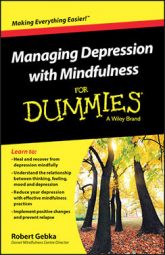Mindfulness is now an evidence-based technique used widely for depression by the NHS (the UK’s free public National Health Service). It is also endorsed by NICE or the National Institute for Health and Care Excellence as an approved therapy for the prevention of relapse of depression.
There are numerous clinical studies which demonstrate the effectiveness of using mindfulness for people suffering from anxiety and depression.
Following is an outline of just a few of such scientific studies:
Mindfulness practices have been shown to significantly reduce anxiety and depression, both in the general population and in a variety of health conditions, including cancer, chronic pain, major depression, bipolar and anxiety disorders.
Mindfulness Based Cognitive Therapy (MBCT) is significantly more effective than antidepressants alone in preventing relapse from depression (patients with a minimum of three episodes.
Studies have found long-term changes in the brains of experienced meditators and those undergoing mindfulness meditation training. An 8-week Mindfulness Based Stress Reduction (MBSR) course results in actual physical changes in the brains of meditation novices. These manifest as increases in grey matter (brain cell bodies) concentrations in brain regions involved in executive reasoning (frontal cortex), learning and memory (hippocampus as above), emotion regulation, self-referential processing and perspective.

